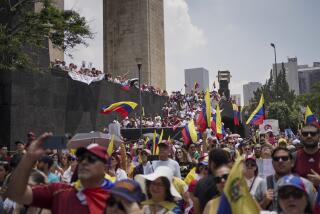Iranian election protesters refuse to give up but change tactics
- Share via
BEIRUT AND TEHRAN — Opponents of Iranian President Mahmoud Ahmadinejad went on the offensive Wednesday, proclaiming his government “illegitimate.” They vowed to continue disputing his reelection despite a violent crackdown on their protests and dire warnings against challenging the vote.
Hours earlier, in a potentially sharp escalation of the rift within the Iranian establishment, the pro-government Basiji militia asked prosecutors to investigate opposition leader Mir-Hossein Mousavi on numerous allegations, including “disturbing the nation’s security,” according to a report by the Fars news agency.
After two weeks of street clashes, Tehran has remained calm for several days. Signaling a return to normality, cellphone text-messaging services, cut off the night before the June 12 election, were restored.
But the latest moves show that the election controversy continues to grip the Islamic Republic despite official attempts to move past the protests and crackdown.
“From now on we will have a government which, from the point of view of ties with the public, is in the weakest of positions,” Mousavi, who according to the official returns lost to Ahmadinejad, wrote in a statement posted on his website and distributed via e-mail. “A majority of society, of which I personally am a member, do not accept the legitimacy of this government.”
The heightened political posturing came as the Interior Ministry, controlled by a wealthy confidant of Ahmadinejad, ordered that election-related political activities stop now that the Guardian Council, which is headed by another ally of the president, has confirmed Ahmadinejad’s reelection.
Other officials, including the country’s supreme leader, Ayatollah Ali Khamenei, also have urged an end to the questioning of the election, calls that have been ignored.
“There’s a deep fissure within the power elite,” said Farhad Khosrokhavar, a political scientist at the School for Advanced Studies in the Social Sciences in Paris, who returned from a visit to Tehran less than a week ago. “Khamenei is supposed to have the final word on everything. But all these people are implicitly defiant toward the supreme leader. All of them reject the notion that the election is over.”
The government’s actions are part of a broad attempt to use the instruments of state to neutralize a movement built on the presidential election campaigns of Mousavi and former parliament Speaker Mehdi Karroubi and the belief among their supporters that Ahmadinejad and his allies, including Khamenei, stole the election.
But along with Mousavi’s e-mail, Karroubi, former President Mohammad Khatami and a leading opposition party also issued statements Wednesday sharply criticizing the government.
The reformists’ forceful, multifaceted response to the Guardian Council’s confirmation Monday of the election results and to the president’s attempt to consolidate his victory served as a striking counter-narrative to the official depiction of the recent unrest. The government says the protests are the work of foreign agents using the news media to sow discord among Iranians and foment a popular uprising, or “velvet revolution,” against the Islamic Republic.
“Given what has been done and declared unilaterally, we must say that a velvet revolution has taken place against the people and the democratic roots of the system,” Khatami wrote.
The strident missives also suggested a shift in tactics by reformists: Now that it appears Ahmadinejad is on his way to being sworn in for another term, they are trying to tarnish the government’s reputation and credibility, weakening its ability to govern, and to sabotage its agenda of funneling oil money into economically questionable populist giveaways, tightening social restrictions and heightening its confrontation with the West.
“This is a government that is not law-abiding, is not transparent and makes bad decisions that are destroying our society,” Mousavi wrote, calling for an end to “militaristic” suppression, a change in election laws and a restoration of civil liberties.
Observers said the reformist camp appeared to be trying to gather momentum for a national strike or more protests in defiance of Khamenei, who the opposition says disregarded tradition and made himself fair game for criticism by openly siding with Ahmadinejad.
“The supreme leader has confronted the emerging opposition and has lost his fatherly role for the nation,” said an analyst in Tehran who requested anonymity.
The letter by the Islamic Participation Front, Iran’s main reformist political alliance, called Ahmadinejad and his supporters “conductors of a coup” against the Islamic Republic. “What these military coup-makers have done is what they have been planning since last year, and all of these actions have badly damaged the face of the governing system in Iran domestically and internationally,” it said.
Karroubi’s missive, published online, decried the “reactionary fanaticism” of Ahmadinejad’s circle and urged “resistance against dictatorship, repression and reactionary and Taliban” Islam.
The government has managed to quell the public protests using batons and tear gas, but the continued criticism against a sitting president and open defiance of the supreme leader herald something new.
“The movement has been repressed, but the discontent is so deep and widespread that it will continue,” Khosrokhavar said. “Major parts of the Iranian electorate don’t believe in the legitimacy of the election.”
--
Mostaghim is a special correspondent.
More to Read
Sign up for Essential California
The most important California stories and recommendations in your inbox every morning.
You may occasionally receive promotional content from the Los Angeles Times.













